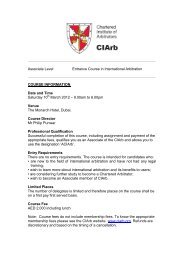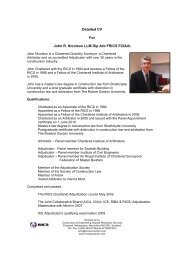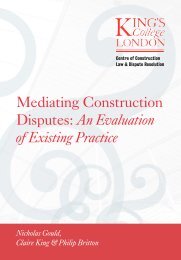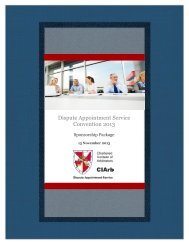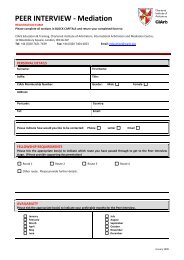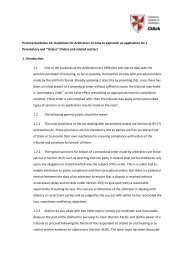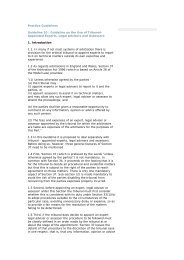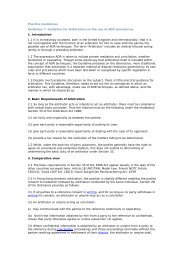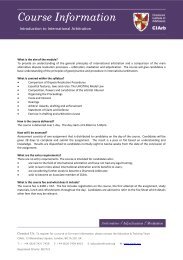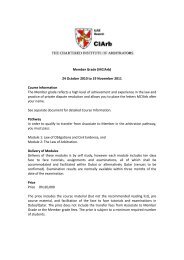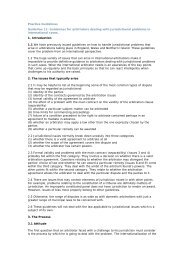Practice Guidelines - CIArb
Practice Guidelines - CIArb
Practice Guidelines - CIArb
Create successful ePaper yourself
Turn your PDF publications into a flip-book with our unique Google optimized e-Paper software.
4.8.4.3 Third, if the arbitrator finds that the claimant would<br />
have achieved the same or more by accepting the offer than<br />
by going on with the arbitration, the usual order to make is<br />
that the claimant is to recover his costs up to the time when<br />
the offer could have been accepted and that in respect of the<br />
period after that time the respondent is to recover his costs<br />
from the claimant. If however the claimant has achieved more<br />
by going on with the arbitration than he would have achieved<br />
by accepting the offer, the offer will have no effect on the<br />
arbitrator’s order as to costs and it will be proper to approach<br />
the subject of costs as if no offer had been made. In deciding<br />
whether the claimant has done better by going on with the<br />
arbitration, it is necessary to make a precise comparison of<br />
the benefit to the claimant in accepting the offer as compared<br />
with the eventual award, so that if the claimant “beats” the<br />
offer, even by a small margin, the offer will have no effect,<br />
unless of course there are special circumstances which affect<br />
the matter.<br />
4.8.4.4 Fourth, in cases where the respondent has made a<br />
counterclaim, the offer should say whether the counterclaim<br />
has been taken into account. If the offer does not do this and<br />
there are no surrounding factors to indicate whether the<br />
counterclaim has been taken into account, the offer should be<br />
presumed to refer only to the claim. If it refers also to the<br />
counterclaim, the arbitrator should consider whether it is<br />
appropriate to make a single order for costs; if it is, he should<br />
compare the success which the claimant has achieved in both<br />
pursuing the claim and resisting the counterclaim with that<br />
which he would have achieved in both respects by accepting<br />
the offer.<br />
4.8.4.5 Fifth, if the offer is made so as to be open for<br />
acceptance for only a limited period, questions can arise as to<br />
whether it should reasonably have been accepted; no hard<br />
and fast rules can be laid down. Similarly, it is not possible to<br />
offer useful guidance in cases where the offer was ambiguous,<br />
incomplete or conditional, save to say that the arbitrator will<br />
be more impressed by the ambiguity or incompleteness of an<br />
offer if the claimant wrote to the respondent pointing it out in<br />
contemporary correspondence than if he refers to it for the<br />
first time in his submissions as to why the offer should not be<br />
taken into account.<br />
4.8.4.6 Sixth, it should be borne in mind that in a case where<br />
the claimant would have achieved more by accepting the offer<br />
than by pursuing the arbitration there can be additional<br />
factors, such as the unreasonable conduct of one or both<br />
parties, which can have the result of making it reasonable to<br />
deprive the claimant of all or part of his costs for the period<br />
up to the time when the offer could have been accepted or to<br />
deprive the respondent of all or part of his costs in respect of<br />
the period after that time.<br />
4.8.4.7 Finally there are circumstances where a claimant (not<br />
the respondent) may wish to make a sealed offer to settle the<br />
case on terms which would give the claimant less than a full<br />
recovery. The object of so doing is so that if the offer is<br />
rejected and the claimant goes on with the arbitration, then<br />
(a) if he obtains a full recovery, he may be able to make a<br />
claim for “indemnity” costs in respect of the period after the<br />
offer could have been accepted (see below under



